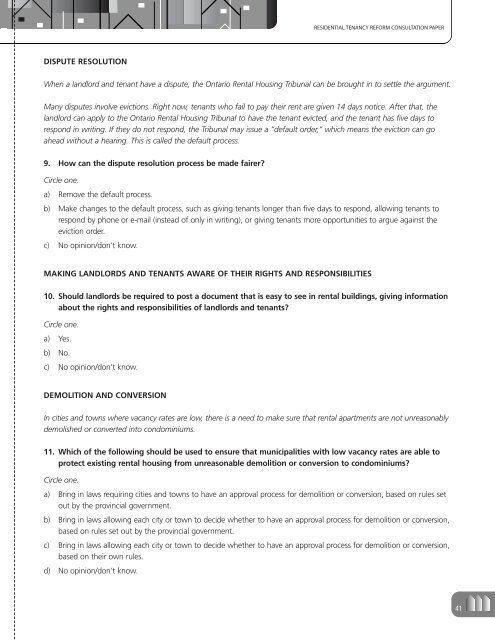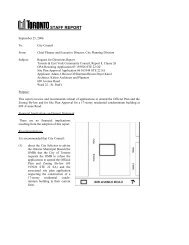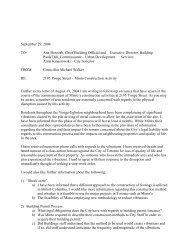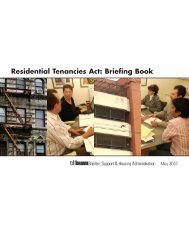Residential Tenancy Reform Consultation Paper
Residential Tenancy Reform Consultation Paper - Michael Walker
Residential Tenancy Reform Consultation Paper - Michael Walker
Create successful ePaper yourself
Turn your PDF publications into a flip-book with our unique Google optimized e-Paper software.
RESIDENTIAL TENANCY REFORM CONSULTATION PAPER<br />
DISPUTE RESOLUTION<br />
When a landlord and tenant have a dispute, the Ontario Rental Housing Tribunal can be brought in to settle the argument.<br />
Many disputes involve evictions. Right now, tenants who fail to pay their rent are given 14 days notice. After that, the<br />
landlord can apply to the Ontario Rental Housing Tribunal to have the tenant evicted, and the tenant has five days to<br />
respond in writing. If they do not respond, the Tribunal may issue a “default order,” which means the eviction can go<br />
ahead without a hearing. This is called the default process.<br />
9. How can the dispute resolution process be made fairer?<br />
Circle one.<br />
a) Remove the default process.<br />
b) Make changes to the default process, such as giving tenants longer than five days to respond, allowing tenants to<br />
respond by phone or e-mail (instead of only in writing), or giving tenants more opportunities to argue against the<br />
eviction order.<br />
c) No opinion/don’t know.<br />
MAKING LANDLORDS AND TENANTS AWARE OF THEIR RIGHTS AND RESPONSIBILITIES<br />
10. Should landlords be required to post a document that is easy to see in rental buildings, giving information<br />
about the rights and responsibilities of landlords and tenants?<br />
Circle one.<br />
a) Yes.<br />
b) No.<br />
c) No opinion/don’t know.<br />
DEMOLITION AND CONVERSION<br />
In cities and towns where vacancy rates are low, there is a need to make sure that rental apartments are not unreasonably<br />
demolished or converted into condominiums.<br />
11. Which of the following should be used to ensure that municipalities with low vacancy rates are able to<br />
protect existing rental housing from unreasonable demolition or conversion to condominiums?<br />
Circle one.<br />
a) Bring in laws requiring cities and towns to have an approval process for demolition or conversion, based on rules set<br />
out by the provincial government.<br />
b) Bring in laws allowing each city or town to decide whether to have an approval process for demolition or conversion,<br />
based on rules set out by the provincial government.<br />
c) Bring in laws allowing each city or town to decide whether to have an approval process for demolition or conversion,<br />
based on their own rules.<br />
d) No opinion/don’t know.<br />
41






